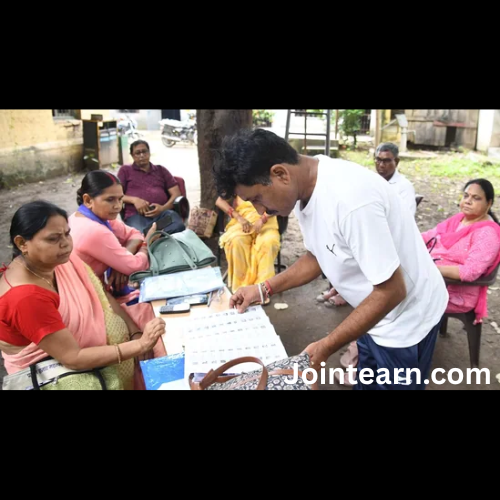
The Election Commission (EC) is set to launch a pan-India Special Intensive Revision (SIR) of electoral rolls starting next week, marking the first nationwide voter list verification exercise in nearly two decades. According to PTI, the first phase will likely cover 10 to 15 states, primarily those heading for elections in 2026, such as Assam, Tamil Nadu, Puducherry, Kerala, and West Bengal.
Officials said the formal announcement for the first phase is expected by the middle of next week. The exercise aims to clean up and update India’s massive voter database — weeding out duplicate, outdated, or ineligible entries — and to ensure all eligible citizens are properly enrolled.
What Is the SIR (Special Intensive Revision)?
The SIR is a large-scale, field-based verification and cross-checking process of the electoral rolls, conducted by the Election Commission (EC). It involves:
- House-to-house verification by booth-level officers (BLOs).
- Deletion of invalid names, such as deceased voters or those who have shifted residences.
- Correction of entries (name, age, address, gender, etc.).
- Addition of new eligible voters, particularly first-time voters aged 18+.
The last major SIRs across India took place between 2002 and 2004, making this the first such countrywide revision in over 20 years.
First Phase: Likely States
The EC plans to begin the rollout with states and union territories that are due for assembly elections in 2026. These include:
- Assam
- Tamil Nadu
- Puducherry
- Kerala
- West Bengal
Officials said the initial list may expand to 10–15 states, with priority given to those where polls are due next year.
However, states where local body elections (panchayat or municipal) are underway or due soon will be excluded from the first phase, since the local election machinery will be preoccupied.
Bihar’s Example and Impact
The EC is drawing lessons from Bihar, which recently completed its SIR in September 2025.
- The final electoral roll published on September 30 listed 7.42 crore voters.
- Around 50 lakh names were deleted, primarily due to death, migration, or duplication.
- Bihar will hold its assembly elections on November 6 and 11, with counting on November 14.
The Bihar exercise served as a pilot model, shaping the EC’s approach for the nationwide rollout.
Cutoff Criterion for States
The EC has clarified that the last SIR conducted in each state will serve as the cutoff point — similar to how Bihar used its 2003 voter list as the reference base.
This means that:
- Each state will compare its current electoral rolls with the voter list from its last SIR.
- The differences (new voters, deletions, relocations) will be mapped, verified, and corrected.
For instance:
- Delhi’s Chief Electoral Officer (CEO) has uploaded the 2008 voter list — from the last SIR — for public verification.
- Uttarakhand’s CEO has published the 2006 SIR voter list online for similar purposes.
Mapping and Preparation
Before starting the revision, the EC held two national conferences with state chief electoral officers (CEOs) to finalize the operational roadmap.
Most states have already:
- Mapped current voter databases with their previous SIR lists.
- Set up teams for on-ground verification and public awareness campaigns.
- Begun reviewing data integrity and duplication issues using digital tools.
The mapping ensures that every name added, deleted, or modified is backed by documentary verification and field checks.
Why the SIR Matters Now
The EC and several political parties — including the ruling BJP — argue that the SIR is necessary to remove ineligible or illegal entries, citing concerns about:
- Duplicate registrations across states.
- Names of deceased individuals still on the rolls.
- Illegal migrants being registered as voters.
Officials say verifying place of birth and citizenship documentation may be part of the process in sensitive border states such as Assam and West Bengal.
This gives the exercise political significance amid ongoing debates over illegal migration from Bangladesh and Myanmar, and the government’s broader push for citizenship and identity verification mechanisms.
Opposition’s Concerns
Opposition parties and civil society groups have criticised the move, warning that:
- The SIR could become a “communal or exclusionary exercise”, disproportionately affecting minorities, especially Muslims.
- Marginalised communities and those lacking documentation — such as migrant workers and the poor — risk being wrongly excluded from voter rolls.
Critics say the EC must ensure transparency, independent oversight, and fair grievance redressal mechanisms to prevent wrongful deletions.
Next Steps
Once the EC announces the first-phase states next week:
- Feasibility and logistics teams will begin local-level training of booth officers.
- Public verification drives will start, allowing citizens to check their names and file corrections.
- Draft revised rolls will be published within a few months.
- The final SIR voter lists are expected to be ready by mid-2026, well ahead of the scheduled state elections.
In Summary
| Aspect | Details |
|---|---|
| Launch | Next week (announcement mid-week) |
| First-phase states (likely) | Assam, Tamil Nadu, Puducherry, Kerala, West Bengal |
| Total cost | Not disclosed yet; similar to Bihar’s large-scale survey |
| Cutoff reference | Last SIR in each state (mostly 2002–2004) |
| Purpose | Clean voter lists, remove duplicates and ineligible names |
| Pilot example | Bihar (7.42 crore final voters, 50 lakh deletions) |
| Opposition concern | Risk of exclusion, communal bias |
| Final list timeline | By mid-2026 before state elections |
In essence, India’s first nationwide voter roll verification in two decades is about to begin — a massive administrative and political undertaking that will shape electoral rolls ahead of the 2026 assembly elections and the 2029 Lok Sabha polls.


Leave a Reply